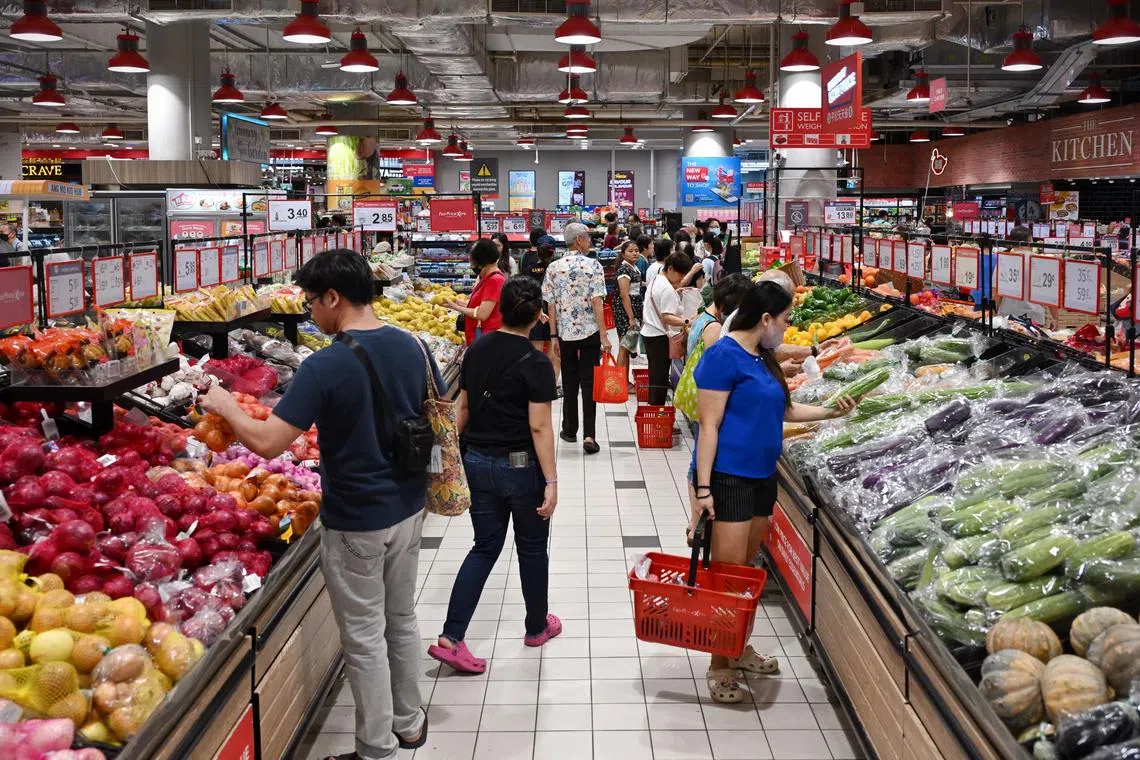Singapore core inflation rises to 0.7% in April but consumer prices not seen heating up in 2025
Sign up now: Get ST's newsletters delivered to your inbox

In April, bigger increases in the prices of services and food more than offset lower retail and other goods inflation.
PHOTO: ST FILE
SINGAPORE - Singapore’s core inflation edged up in April, snapping six straight months of year-on-year declines, but the Government and economists see any further rise in consumer prices staying modest in 2025 given the big uncertainties in global trade.
Core inflation climbed to 0.7 per cent year on year, from a four-year low of 0.5 per cent in March
It came in higher than the 0.5 per cent forecast by economists in a Bloomberg survey.
Core inflation excludes private transport and accommodation costs to better reflect the expenses of households here.
It rose in April as bigger increases in the prices of services and food more than offset lower retail and other goods inflation.
OCBC Bank chief economist Selena Ling said the higher-than-expected bump in April should not be too alarming, given the current heightened tariff uncertainties.
“Given the lack of clarity on US tariffs, even with the ongoing trade negotiations, especially pertaining to the eventual outcome of the 90-day China trade truce, the disinflation path is likely still bumpy,” she said.
Overall – or headline – inflation was 0.9 per cent, unchanged from March but higher than the 0.8 per cent expected in the Bloomberg poll. It came as lower accommodation and private transport inflation offset the rise in core inflation.
Despite April’s core inflation rise, MAS and MTI left unchanged their forecasts for core and overall inflation to average 0.5 per cent to 1.5 per cent in 2025.
They reiterated their statement in April that “the risks to inflation are tilted towards the downside given heightened uncertainties in the external environment”.
“Although the trade conflicts could be inflationary for some economies, their impact on Singapore’s import prices is likely to be more than offset by the disinflationary drags exerted by weaker global demand,” they said.
Global crude oil prices are projected to be lower compared with 2024, while food commodity price increases should also stay contained, they added.
DBS Bank senior economist Chua Han Teng noted that Singapore’s inflation remained contained in April, staying within the lower half of MAS’ unchanged 2025 forecast range.
The bank foresees modest core inflation for the rest of 2025, as it expects contained imported inflation and reduced pass-through of business costs to consumer prices.

Both OCBC and DBS echo the MAS’ still-dovish assessment and also see downside risks to inflation from global trade uncertainties.
“There is no urgency per se to ease monetary policy again immediately after the January and April moves, but the window may still be open should core inflation take another leg lower,” Ms Ling said.
MAS in April reduced the pace of the Singapore dollar’s trade-weighted appreciation
Despite the 90-day US reciprocal tariff pause
A global trade slowdown could also spill over negatively to Singapore’s export-reliant economy, weakening domestic labour demand and wage growth, which could result in more subdued domestic cost pressures, he added.
April’s inflation report showed that food inflation edged up to 1.4 per cent from 1.3 per cent in March, as the prices of non-cooked food rose at a quicker pace.
Services inflation rose to 1.1 per cent, from 0.6 per cent in March, owing to a larger increase in the cost of health insurance and a smaller decline in airfares.
Electricity and gas prices fell 3.5 per cent. The report noted that electricity and gas tariffs declined at a similar pace in April and March.
Prices of retail and other goods dropped 1.2 per cent, after falling 0.5 per cent in March. They fell at a faster pace – owing to a decline in clothing and footwear prices and a sharper drop in the cost of medicine and health products – which offset the increase in water prices.
Private transport inflation eased to 1.3 per cent, on the back of a smaller increase in car prices and a larger decline in petrol prices, from 2.1 per cent in March.
Accommodation inflation moderated to 1.1 per cent, from 1.4 per cent in March, owing to smaller increases in housing rents and housing maintenance and repair costs.


